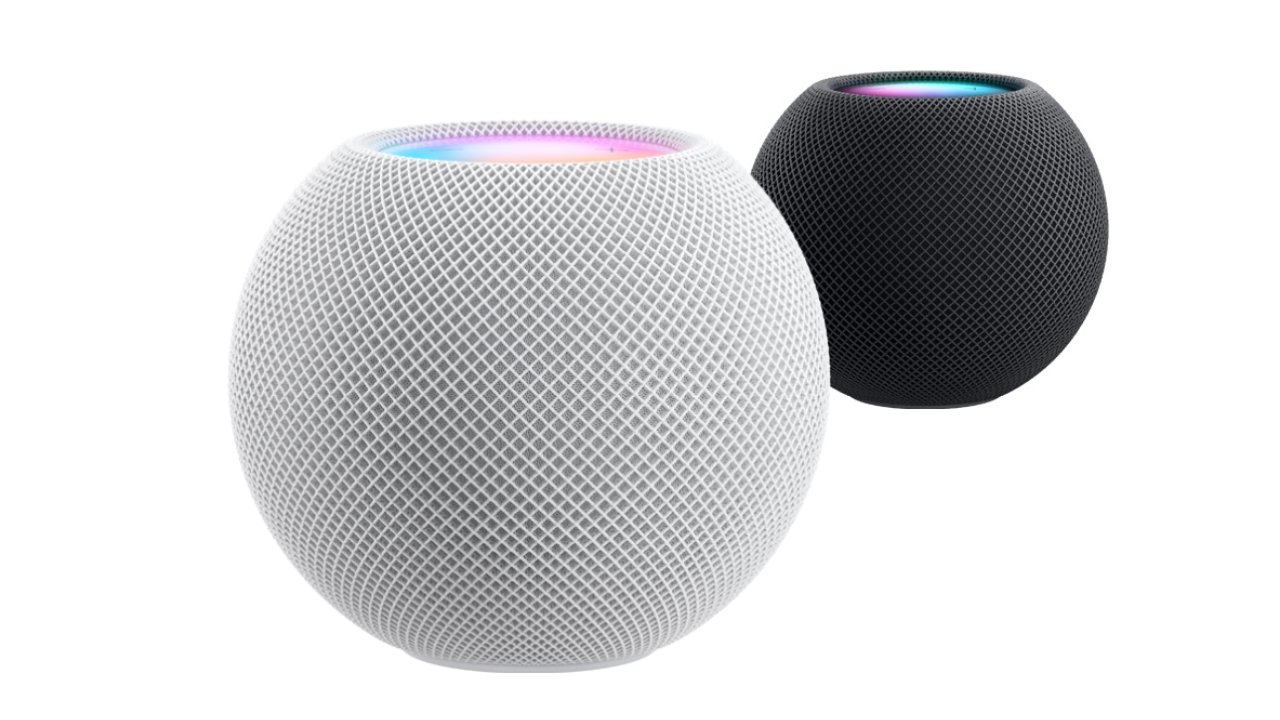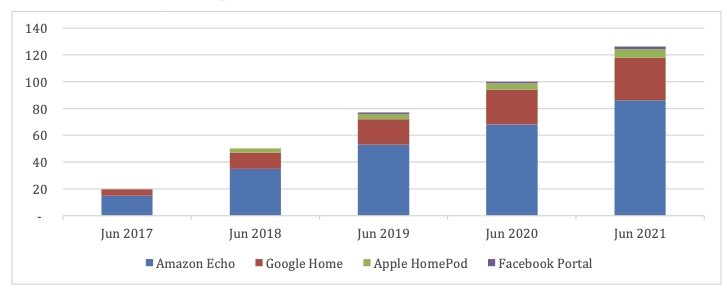Apple's HomePod, HomePod mini 'largely absent' in smart speaker market
New research claims that Apple's HomePod and HomePod mini come a distant third to Amazon and Google smart speakers, both of which have far more homes with multiple devices.

HomePod mini
The latest market report from Consumer Intelligence Research Partners (CIRP) says that over two-thirds of smart speakers in the US are Amazon's. Google accounts for about a quarter of the market, and the very little left is occupied by both Apple and Facebook.
"The installed base of smart speakers grew considerably during the COVID-19 pandemic, adding over 25 million units in the past year," said CIRP Partner and Co-Founder, Josh Lowitz, in a statement. "Amazon created the marketplace when it released the first Echo almost seven years ago."
"Two years later Google took meaningful share, but quickly plateaued at around 40% of Amazon's presence," he continued. "A few months after Google, Apple introduced its version, and failed to make meaningful inroads, with a single premium- priced model competing against products that included low-priced entry-level devices."
According to CIRP, there were 126 million smart speakers in US homes in June 2021, of which 69% are made by Amazon. CIRP also researched how many households had more than one smart speaker.
"One critical goal for everyone in the industry is to get as many units into as many homes as possible," CIRP Partner and Co-Founder, Mike Levin, said in the statement. "With multiple devices in a single home, a smart speaker platform can claim that literal real estate as theirs, as barriers to switching get very high."
"Amazon leads the way with customers with multiple devices," he continued. "We estimate over 20 million US households have more than one Echo, while about 8 million US households have multiple Google Home units."
The research firm says its estimate is that over 20 million US homes have more than one Amazon device. Around 8 million households have more than one Google device, while only 2 million have more than a single Apple smart speaker.

Smart Speaker insstalled base (source: CIRP)
CIRP's research does not distinguish between Apple's original HomePod, and the HomePod mini. The research is based primarily on a survey of 500 US owners of smart speakers, who owned at least one device as of June 30, 2021.
Apple discontinued the original HomePod in March 2021, but stock remained available until mid-June.
Read on AppleInsider

HomePod mini
The latest market report from Consumer Intelligence Research Partners (CIRP) says that over two-thirds of smart speakers in the US are Amazon's. Google accounts for about a quarter of the market, and the very little left is occupied by both Apple and Facebook.
"The installed base of smart speakers grew considerably during the COVID-19 pandemic, adding over 25 million units in the past year," said CIRP Partner and Co-Founder, Josh Lowitz, in a statement. "Amazon created the marketplace when it released the first Echo almost seven years ago."
"Two years later Google took meaningful share, but quickly plateaued at around 40% of Amazon's presence," he continued. "A few months after Google, Apple introduced its version, and failed to make meaningful inroads, with a single premium- priced model competing against products that included low-priced entry-level devices."
According to CIRP, there were 126 million smart speakers in US homes in June 2021, of which 69% are made by Amazon. CIRP also researched how many households had more than one smart speaker.
"One critical goal for everyone in the industry is to get as many units into as many homes as possible," CIRP Partner and Co-Founder, Mike Levin, said in the statement. "With multiple devices in a single home, a smart speaker platform can claim that literal real estate as theirs, as barriers to switching get very high."
"Amazon leads the way with customers with multiple devices," he continued. "We estimate over 20 million US households have more than one Echo, while about 8 million US households have multiple Google Home units."
The research firm says its estimate is that over 20 million US homes have more than one Amazon device. Around 8 million households have more than one Google device, while only 2 million have more than a single Apple smart speaker.

Smart Speaker insstalled base (source: CIRP)
CIRP's research does not distinguish between Apple's original HomePod, and the HomePod mini. The research is based primarily on a survey of 500 US owners of smart speakers, who owned at least one device as of June 30, 2021.
Apple discontinued the original HomePod in March 2021, but stock remained available until mid-June.
Read on AppleInsider

Comments
Also, are they counting purely Amazon/Google products, or other compatible devices like Sonos Ones in this count? I have a couple of Sonos Ones and Beams that support Echo and Home, but have the feature turned off...but I guess that probably still "counts" toward the totals for those services.
In any event, Sonos doesn't have much of a footprint anyway. A report from last April pegged their market share at just under 5% so they'd hardly be contributing to either the Amazon or Google numbers even assuming they are being counted in some manner.
Took me years to realize that cheap often meant more money in the long run. It's certainly not always true but it is frequently true.
Regardless, I wouldn't have a voice activated smart assisted speaker in my house if my words are recorded/transcribed into a company's servers. Most certainly Amazon is widely doing this. And what little you can control from the app is fluffy and IMHO misleading settings such as "manage how your data improves Alexa" (we wouldn't want Alexa to not be improved, right?).
The sound from the Minis doesn't compare at all to the OG Homepods. They are on a completely different level in sound quality and output volume.
But as different as the Mini is from the OG, the Echo Dot is just that far below the Mini in sound quality. (Which is entirely expected for a $100 product to outshine a $30-$40 product.)
And frankly we use them more as speakers than we do as voice assistants.
We can ask it to play stuff for us, set timers, answer trivia. We can even ask it to play our playlists (well, of the family member who set it up) or use it as a remote speaker. But the other night as we were going to bed we heard it playing some expletive-laden rap music from some imaginary playlist which no users have or know. I expect it to adopt a HAL9000 voice and not let us out of the house any day now.
HomePods, are too spooky to be popular.
Timing. Apple is often late to a market but blows everyone else away with what they introduce. HomePod's sound blew everyone away, but everything else was a let down. Unfortunately for Apple, few people will pay for high quality sound. Most listen though crappy headphones or laptop speakers so great sound wasn't much of a selling point.
Price. The original HP was just way too expensive. 3x more than the next most expensive smart speaker at the time. They sold so poorly that in 2021 people were receiving models with serial numbers from 2017. Even the mini is expensive. Other than privacy and marginally better sound quality, what do you get from the HP mini that you can't get in a $30 Dot? For $50 you can have a "smart" Alexa home, with voice activated lights, and $30 for each additional speaker. Or you can go Homekit and the initial cost is $120, with $100 for each speaker. People are willing to pay more for Apple products because they work well. Only the HomePods don't because the main interface is decidedly less good than average: Siri.
Siri is crap. A MobileMe-esque disaster, but Cook apparently hasn't the teeth to get it sorted out. Aside from false activations and then not activating when I say "Hey Siri", it's actually embarrassing how often it totally fails to understand. Playing a song rather than turning lights on, or answering with some unwanted quip, less than funny. I have a 300mbps fibre connection and Siri is still regularly slow to reply. Often it needs my iPhone to be on the same wifi network for things like notes and reminders, despite having full access to exactly that data via iCloud. Siri hasn't materially improved since the iPhone 4. And in some cases it's worse than the 3G's voice controls feature, i.e. it's not on-device, so it fails or is slow to reply. This has of course been partially fixed with iOS 15, but apparently requires AI hardware. The iPhone X's AI hardware isn't good enough, but the iPhone 3G's non-existent AI hardware was apparently just fine for pre-Siri voice recognition. The original HP has an A8 CPU (iPhone 6 era) so it's never going to get on-device recognition. Out of the 10 or so people I know with iPhones, no one uses Siri. It's just too unreliable. And even when it understands you, some obscure bug rears its head and the request fails even if it's the exact same request you made earlier. "Alexa" though, I hear at least once a week.
Thirdly, features. Amazon smart speakers have a multitude of powerful skills you can install. HomePod? Nothing. Until recently you couldn't even change the default streaming provider. Shortcuts are a crap patch. Again relies on your phone to do the processing.
Apple is a $2tn company. It really needs to stop introducing so many "magical" next best things and then abandoning them. That's what startups do when they haven't the man power. Apple definitely has the manpower.